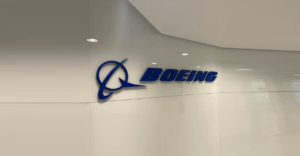Boeing Names Jeff Shockey as Top Lobbyist Amid Trump’s Air Force One Delays Criticism and FAA Scrutiny
Boeing has appointed Jeff Shockey as its new chief lobbyist amid growing challenges, including criticism from President Trump over delays in delivering the next-generation Air Force One. The company faces scrutiny over manufacturing quality following a 2024 mid-air emergency and potential new tariffs affecting production. Meanwhile, the FAA has imposed a cap on 737 jet production, with regulators demanding improvements before lifting restrictions.
CONTENT:

Boeing Names Jeff Shockey as Top Lobbyist Amid Trump’s Air Force One Delays Criticism and FAA Scrutiny
Boeing has appointed Jeff Shockey as its new chief lobbyist as the company navigates several challenges in Washington, including criticism from President Donald Trump over delays in delivering new Air Force One jets.
Shockey, who previously led global government relations at aerospace and defense company RTX (formerly Raytheon), is returning to Boeing after the previous head of government affairs left in December. He has also served as vice president of global sales and marketing for Boeing Defense, Space & Security, as well as a senior lobbyist for the company and a former aide in the U.S. House of Representatives.
Boeing is facing potential new tariffs that could impact airplane production and exports, as well as heightened scrutiny over its manufacturing quality following a mid-air emergency involving an Alaska Airlines 737 MAX 9 in 2024.
On Wednesday, Trump expressed frustration with Boeing over the significant delays in delivering the next-generation Air Force One aircraft, even suggesting he might seek alternative options. The company has already incurred over $2 billion in losses on the contract for the two new presidential planes. A White House official recently indicated that the Air Force One program may now be delayed until 2029 or later.
Boeing CEO Kelly Ortberg is scheduled to testify before the Senate Commerce Committee on April 2 regarding the company’s response to the Alaska Airlines incident. Committee Chair Senator Ted Cruz stated that Boeing has faced too many safety issues in recent years, and the public deserves to know what steps are being taken to restore confidence. Meanwhile, Trump’s nominee for deputy transportation secretary, Steve Bradbury, emphasized the need for stricter regulatory oversight of Boeing.
Following the Alaska Airlines incident, the Federal Aviation Administration (FAA) imposed a cap limiting Boeing’s production to 38 737 jets per month. The company is also still awaiting FAA approval to sell two new versions of the 737 MAX. Acting FAA Administrator Chris Rocheleau and Transportation Secretary Sean Duffy are set to visit Boeing’s Seattle facilities in mid-March to assess the company’s quality improvements. Duffy has made it clear that the production cap will remain in place until he is satisfied with Boeing’s progress.
Boeing Appoints Jeff Shockey as Chief Lobbyist Amid Trump’s Criticism
Boeing has named Jeff Shockey as its new top lobbyist as the company faces increasing challenges in Washington, including criticism from President Donald Trump over delays in delivering the next-generation Air Force One aircraft.
Shockey, who previously served as head of global government relations at RTX (formerly Raytheon), is returning to Boeing following the sudden departure of its previous head of government affairs in December. He has also held roles as vice president of global sales and marketing for Boeing Defense, Space & Security, as well as a senior lobbyist and a former aide in the U.S. House of Representatives.
Boeing is currently grappling with potential new tariffs that could affect its aircraft production and exports. Additionally, the company is under scrutiny regarding its manufacturing quality after a 2024 mid-air emergency involving an Alaska Airlines 737 MAX 9.
On Wednesday, Trump expressed dissatisfaction with Boeing over the significant delays in the delivery of the new Air Force One planes and hinted at the possibility of seeking an alternative supplier. The company has incurred losses exceeding $2 billion on the contract for the two presidential aircraft. Trump had raised concerns about the delays in a conversation with Boeing CEO Kelly Ortberg shortly after his election in November. A White House official recently stated that the Air Force One program might now be postponed until 2029 or later.
Ortberg is scheduled to testify before the Senate Commerce Committee on April 2 to discuss Boeing’s response to the Alaska Airlines incident. Committee Chair Senator Ted Cruz emphasized that Boeing has faced numerous safety issues in recent years and that the public deserves transparency regarding the company’s efforts to regain trust.
Trump’s nominee for deputy transportation secretary, Steve Bradbury, asserted that regulators need to impose stricter oversight on Boeing.
Following the Alaska Airlines incident, the Federal Aviation Administration (FAA) placed a cap on Boeing’s production, limiting it to 38 737 jets per month. The company is also seeking FAA approval to sell two new variants of the 737 MAX.
Acting FAA Administrator Chris Rocheleau and Transportation Secretary Sean Duffy are set to visit Boeing’s Seattle facilities in mid-March to assess the company’s progress in improving quality standards. Duffy has stated that the production cap will remain in place until he is convinced of Boeing’s improvements.
Check out TimesWordle.com for all the latest news
You must be logged in to post a comment.